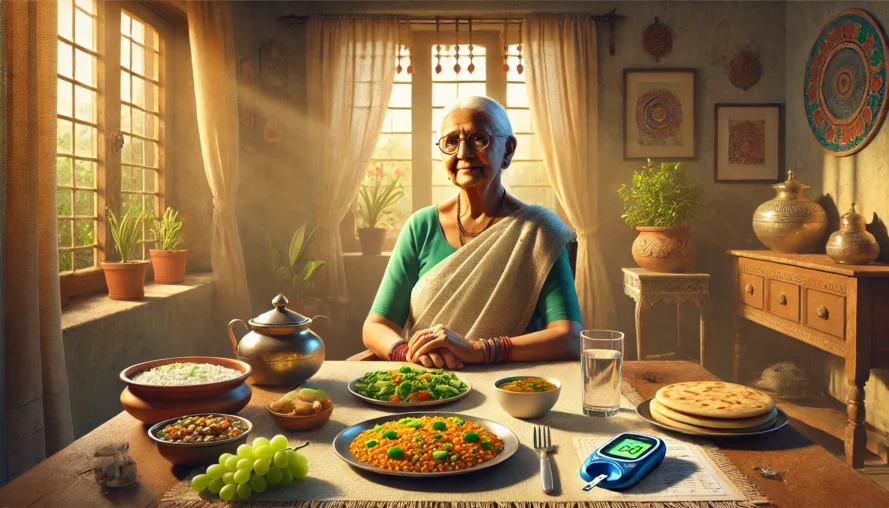In part one we discussed the emotional landscape of diabetes in senior citizens from the initial shock of diagnosis to the small, meaningful steps toward self-care. Today, in part two, we’ll discuss in-depth the challenges senior citizens face when managing diabetes.
The first step in this journey begins with one vital factor, and that is curiosity and commitment. If you are reading this it means you have already started the process and that’s the spirit we need to embrace every challenge that diabetes imposes. But let us be honest challenges, stubbornness, and refusal to adapt, can feel like walls. The good thing is they are walls that can be scaled, one layer at a time. So let’s tackle these obstacles, not just with practicality but with a sense of purpose and self-love.
Physical Challenges: When Your Body Feels Like a Stranger
Imagine waking up every day with the knowledge that your body no longer works as it once did.
For elderly people with diabetes, getting out of bed can be sore, tiring or sting with the feeling of neuropathy. And to be able to get past that, for them, it is where the challenge lies. To feel in a body that has seemingly stopped working is harsh, and it is what they have to go through on a daily basis.
But the physical pain is just the beginning. Let’s discuss 0about the emotional toll. Diabetes is an unrelenting disease, requiring constant vigilance and lifestyle management. For senior Citizens, with diabetes develop Peripheral neuropathy and high blood sugar along side, both of which are far too common in the elderly. Feeling pins and needles, burning sensations, and losing the sensation in hand and feets are but some of the sensations that they have to endure; walking, holding objects and even temperature changes painful, and with it, the chances of falling and injuring themselves greatly increase.
Mental Health Struggles and Unspoken Grief
Let’s not forget about the mental health struggles that come with the territory. Depression and anxiety are prevalent among seniors with diabetes. The constant need for vigilance, combined with physical pain and social isolation, creates a fertile ground for emotional distress. Many seniors feel invisible—their struggles overshadowed by the general assumption that aging itself is to blame for their difficulties. But diabetes isn’t just a side effect of aging; it’s a relentless force that demands attention and care.
And then there’s the unspoken grief. For many seniors, diabetes feels like a thief that’s stolen the life they once knew. Dreams of a carefree retirement, filled with travel and leisure, are often replaced by endless doctor’s appointments and the grind of managing a chronic disease. It’s not just the physical limitations; it’s the emotional weight of adjusting to a new normal that feels anything but normal.
Financial Strain: The Hidden Cost of Care
Financial strain is another burden that often goes unnoticed. Managing diabetes isn’t cheap, and for seniors on fixed incomes, the costs can be devastating. Between glucose monitors, test strips, insulin, medications, and regular doctor visits, the expenses add up quickly. Many seniors face the impossible choice of prioritizing their health or meeting other basic needs, such as food or housing. Financial insecurity can worsen blood sugar control, creating a vicious cycle.
For some, diabetes is not just a thief of health but a strain on relationships. Family dynamics often shift as adult children step into caregiving roles, sometimes reluctantly. This can lead to resentment on both sides the senior may feel like a burden, while the caregiver might feel overwhelmed. Marital relationships can also be strained, as partners adjust to new caregiving responsibilities that often come with diabetes.
The Fear of Isolation
Diabetes can be a kind of disease that can alienate many senior citizens. It’s not something new to feel that your family and friends don’t know what you’re struggling with. Attending parties often turn out to be a barrage of ‘whys’ and ‘explanations’.
“Why aren’t you trying the cake? You always loved the cake!”
Well-meaning but frustrating, isn’t it?
Wrapping Up: Your Story, Your Strength
Diabetes is not your defining chapter; it’s a subplot in a story of resilience, courage, and transformation. You’ve faced countless trials before and emerged stronger. This is no different. So, as you move forward, keep this in mind: you are not alone, and every step you take is a testament to your strength and spirit.
In the third part, we’ll discuss the solutions to thrive with diabetes, surrounded by care, knowledge, and love. Until then keep reading foramz for your daily dose of emotional support.


Leave a Reply